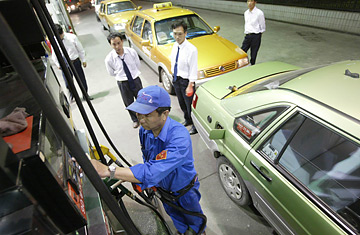
Taxi drivers line up to buy fuel in Shandong, China
The next time you complain about the high price of gas, think of Mr. Ma. The owner of small logistics firm in Beijing, Ma was forced to shut it down temporarily earlier this week after he simply couldn't find enough diesel to fuel his company's 20 trucks. "Gas stations even serving diesel have been difficult to come across," says Ma, who didn't wish to give his first name. "I'm losing 100,000 renminbi [$12,500] a day."
With crude oil closing in on $100 a barrel, the pinch of higher prices is being felt worldwide. In China, however, the impact of the hikes has been shortages at the pump, and tempers are running hot. Last weekend, a man was fatally stabbed in Shandong province after he jumped the queue at a local gas station. A second man in Henan province was killed in a similar incident Tuesday.
The crisis is largely one of China's own making. To reduce inflationary pressures on its red-hot economy, Beijing has not raised prices at the pump, which are set by the government, since May 2006. In that same period of time, international oil prices have risen about 30%, sticking refineries with spiraling costs for the crude they buy and shrinking profits for the gasoline they sell. Some smaller refineries stopped production altogether to avoid losses, while others begun hoarding their crude supplies, leading to gas shortages around the country.
In an effort to ease the pressure, China's economic planner, the National Development and Reform Commission, on Wednesday announced an almost 10% increase in domestic gasoline and diesel prices, calling the move an "urgent step" needed to tamp down demand and encourage refiners to ramp up production. The price hike is likely to alleviate the shortages — that is, until the next increase in global crude prices, says Gordon Kwan, a Hong Kong–based oil and gas analyst for CLSA Ltd. "When retail prices [in China] are nearly a third lower than in the rest of the world, why would producers want to boost supply?" Kwan asks. "The best way to solve the problem is to lift government regulation on prices."
But given Beijing's preoccupation with maintaining social harmony, that isn't likely to happen soon. "Most of China's population simply can't afford international prices," Kwan says. Chinese drivers, of course, agree. "They could have at least been more patient," says Huang Youfeng, waiting in line to fuel his sedan at a Beijing gas station Thursday. "Start the increase at 0.2 renminbi [2.5 cents] per liter — it would have been more acceptable." The irony is that Chinese demand has driven much of the nearly fourfold increase in oil prices since 2000. The country is now the world's second largest consumer of oil products, and consumption has grown 8.7% annually for the past five years. That compares with only 1.5% in the rest of the world.
In addition to the price increase, which went into effect Thursday, the government also said it will require the country's biggest refiner, state-owned China Petroleum & Chemical Corp., known as Sinopec, to increase output and imports of oil products. Sinopec said Wednesday it will run its refineries at full capacity in November, bearing "heavy losses" to guarantee market supply. It will also halt all exports of gasoline and diesel for the time being. As in the past, however, any losses will likely be covered by billions of dollars in government subsidies.
Economists note that at least part of China's soaring demand comes from its artificially low prices. Together, the Chinese and Indian governments provide suppliers about $15 billion a year in subsidies. A recent report by consulting firm McKinsey & Co. estimates that "ending fuel subsidies worldwide would cut demand for transportation fuels by three million barrels a day" — about 3.4%. Meanwhile, the recent shortages have led at least one Beijing resident to rethink his personal fuel consumption. Stuck in line at a gas station Wednesday, Du Peng remarked, "Now I'll have to reconsider my plan to purchase an SUV."
